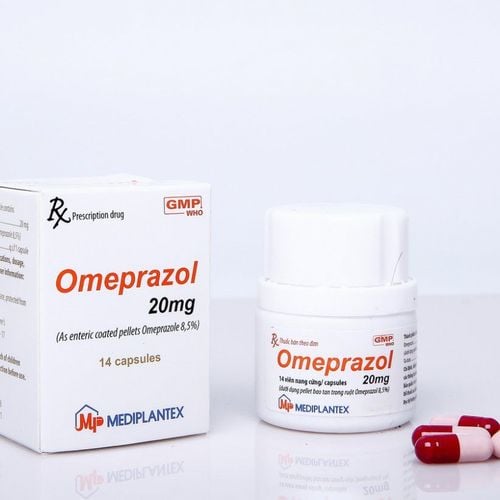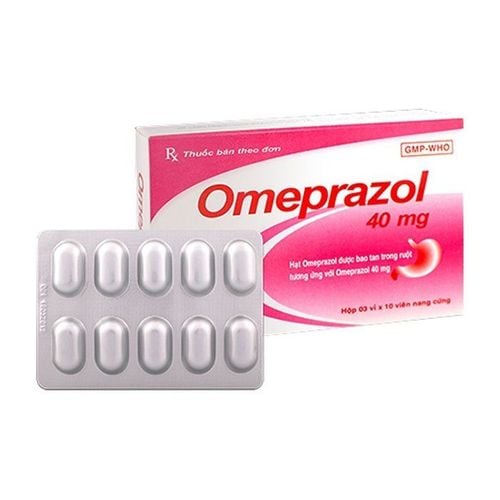This is an automatically translated article.
Although not too dangerous, stomach disease greatly affects the patient's quality of life and work efficiency. Therefore, the research into the drug omeprazole dhg will help patients solve this problem. The following article will help you understand what omeprazole dhg is, what omeprazole dhg does, as well as how to use omeprazole dhg.
1. What is Omeprazol DHG?
Omeprazole is a product with the following main ingredients: Surfactant Disodium hydrogen orthophosphate, mannitol sugar, sodium lauryl sulfate, calcium carbonate, hydroxypropyl methyl E5, starch and some other excipients just enough.
Omeprazole is one of the drugs that treat gastrointestinal diseases by blocking and limiting the secretion of acid in the stomach, on the list of essential drugs of the World Health Organization (WHO). The drug acts directly on the secretion of acid by the mechanism by reversible inhibition of the enzyme hydrogen - potassium adenosine triphosphatase (proton pump) in the parietal cells of the stomach. This mechanism has a quick effect in reducing acid secretion without being affected by internal factors as well as external food, the effect is long-lasting but reversible (so just use it every day). use 1 tablet). The drug, other than reducing gastric acid secretion, has no other significant effect, no effect on acetylcholine or histamine receptors.
The drug after oral administration is completely absorbed in the small intestine after 3-6 hours. Absorption of the drug is not affected by food, most of the drug will be bound to plasma proteins and transferred to tissues, mainly in the parietal cells of the stomach. The half-life of the drug is short and is completely eliminated in the liver. Time of drug elimination in the liver is fast, mainly through urine and a small part through feces. Experiments show that the time of metabolism and elimination of the drug does not show any difference in the elderly or people with impaired renal function. In addition, the accumulation of drugs and metabolites in the body has not been observed in patients with impaired liver function.
The drug is formulated in many different forms, including: delayed-release capsules, slow-release tablets, powder for oral suspension, powder for injection. Omeprazol dhg is researched and manufactured by DHG Pharmaceutical Company (DHG Pharma)
2. What are the effects of omeprazole dhg?
Omeprazole dhg reduces gastric acid secretion, so it is effective in the treatment of gastric and upper gastrointestinal diseases such as peptic ulcer, symptoms of Zollinger - Ellison syndrome, reflux gastritis - oesophagitis, gastritis caused by HP bacteria, esophagitis caused by gastric reflux,... In the treatment of stomach ulcers caused by HP bacteria, it can be combined with other antibiotics according to instructions. doctor's prescription to increase the effectiveness of treatment. Omeprazole dhg works by direct action on the final stage of gastric acid secretion, leading to a rapid decrease in the amount of gastric juice secreted under any stimulus from within the body or from the stomach. food. In addition to the effect on gastric acid secretion, the drug has no effect on acetylcholine or histamine receptors and does not have any other significant pharmacokinetic effects. Stomach acid also did not increase again after stopping the drug.
3. How to use Omeprazole DHG
3.1. Contraindications of Omeprazol DHG: Do not use omeprazole dhg for people who are hypersensitive to any of its ingredients. Although the use of omeprazole has not been shown to cause malformations or toxicity to the fetus, omeprazole should not be used in pregnant women and omeprazole should not be used in lactating women.
Use under the guidance of a doctor and must carefully read the manufacturer's instructions for use before use. The usual dose for oral capsule or tablet form is taken 30 minutes before meals, usually in the morning, 1 tablet per day. Dosage and duration of treatment must comply with the doctor's orders. Reference dosage for some specific diseases:
For the treatment of esophagitis syndrome due to gastroesophageal reflux disease: The usual dose Dosage is 20 - 40 mg (1 - 2 tablets) x 1 time / day, for 4 to 8 weeks, and can be maintained at a dose of 20 mg once daily. For ulcer treatment: Take 20 mg (1 tablet) x 1 time/day, 40 mg (2 tablets) in severe cases, for 4 weeks if it is duodenal ulcer, for 8 weeks if it is stomach ulcer thick. For treatment of Zollinger - Ellison syndrome: Oral dose of 60 mg (3 tablets) x 1 time / day, if the dose is higher than 80 mg (4 tablets), divided into 2 times per day. For children under 10kg take 5mg/day For children from 10kg-20kg take 10mg/day (20mg/day). This dose may be increased depending on the condition, the course of the disease and the patient's physical condition. Medical conditions and disorders that can reduce the effectiveness of the drug as well as increase the severity of the disease if using omeprazole include: a history of hypomagnesemia, diarrhea, osteoporosis or other medical conditions. bones, joints, history of epilepsy, liver dysfunction diseases.
Missed dose, overdose when using Currently there is no specific medicine for overdose, if you overdose and need to go to the nearest medical facility if you encounter dangerous symptoms such as: nausea, heart palpitations, dry mouth, memory loss...
If you can take a supplement as soon as you realize you forgot to take it, or skip the previous dose if it's time for the next dose.
3.2. Drug Interactions Co-administration of omeprazole with other drugs may affect the absorption and effectiveness of treatment of related diseases. Some drugs cause interactions such as drugs metabolised by cytochrome P450 enzymes, cyclosporin, clarithromycin and nifedipine. Be careful when using with antibiotics and anticoagulants.
In addition, living habits and lifestyle also affect the effectiveness of drugs such as drinking alcohol, smoking. Therefore, during the use of the drug should not use alcoholic beverages and other stimulants.
3.3. Side effects of Omeprazol DHG The following are the side effects (not all) that may be encountered when using the drug:
Sneezing Runny nose - burning throat Fever Stomach pain Nausea Diarrhea Bloating Headache, flowers Eyes, dizziness Urticaria, rash Drowsiness Note that people who are using drugs have to drive long distances or work with sharp and dangerous machines, they need to be protected and have reasonable rest because of the drug. cause drowsiness.
Serious side effects:
Bloody stools Severe diarrhea Signs of hypomagnesemia: dizziness, arrhythmia, chest pain, shortness of breath, muscle weakness, convulsions... In addition, during Using the drug, if any unwanted effects occur that the patient feels serious, immediately notify the nearest doctor, pharmacist or medical staff for timely handling.
Vinmec International General Hospital is one of the hospitals that not only ensures professional quality with a team of leading medical professionals, modern equipment and technology, but also stands out for its examination and consultation services. comprehensive and professional medical consultation and treatment; civilized, polite, safe and sterile medical examination and treatment space.
Please dial HOTLINE for more information or register for an appointment HERE. Download MyVinmec app to make appointments faster and to manage your bookings easily.













